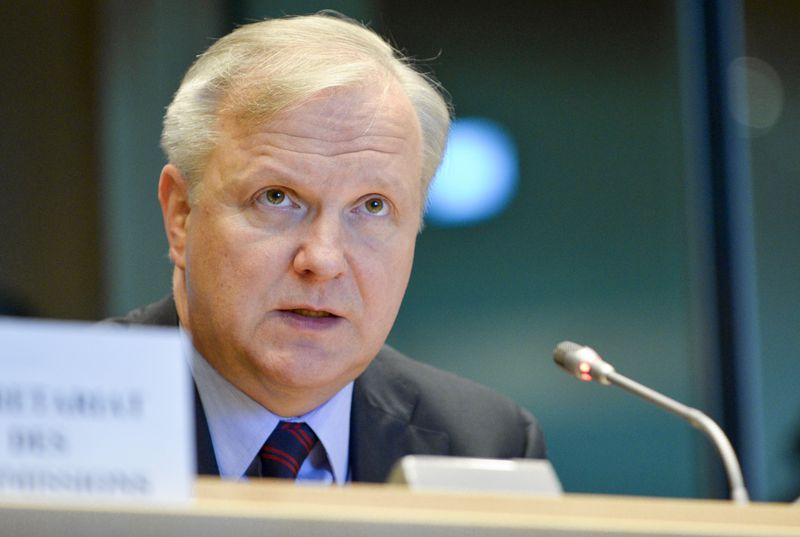Commission and ECB against Eurogroup: There Is a Problem with Decision-Making!
Adelina Marini, May 10, 2013
 "We have to recognise the structural problems of our decision-making in the area of economic and financial affairs. This calls for the completion of the Economic and Monetary Union, which should bring the current inter-governmental arrangements into the Community framework and strengthen the external representation of the euro are". This is what European Commission Vice President and Economic and Monetary Affairs Commissioner Olli Rehn said during the first hearing of the European part of the troika (European Commission and ECB, without IMF) in the European Parliament economic committee. A day earlier, before the economic committee Eurogroup chief Jeroen Dijsselbloem said it was not realistic to expect any reconsideration of the way decisions are made. The Dutch finance minister defended the intergovernmental structure of the Eurogroup saying that this was the existing framework at the moment.
"We have to recognise the structural problems of our decision-making in the area of economic and financial affairs. This calls for the completion of the Economic and Monetary Union, which should bring the current inter-governmental arrangements into the Community framework and strengthen the external representation of the euro are". This is what European Commission Vice President and Economic and Monetary Affairs Commissioner Olli Rehn said during the first hearing of the European part of the troika (European Commission and ECB, without IMF) in the European Parliament economic committee. A day earlier, before the economic committee Eurogroup chief Jeroen Dijsselbloem said it was not realistic to expect any reconsideration of the way decisions are made. The Dutch finance minister defended the intergovernmental structure of the Eurogroup saying that this was the existing framework at the moment.
Is a new wave of inter-institutional tension approaching?
The hostilities among EU institutions and the member states are not new and during the crisis they exacerbated very much on a number of occasions. The Cypriot crisis was the latest case that made Brussels officials nervous. Olli Rehn and the member of ECB executive board, Jorg Asmussen (Germany), appeared in the economic committee a day after Jeroen Dijsselbloem to answer various questions about the chaos that was caused in the course of drafting the Cypriot bailout programme. The main criticisms of MEPs were that the programme was agreed too late, that measures were proposed that scared investors and which were afterwards withdrawn. Too much time was lost.
Olli Rehn answered all this criticism by transferring the entire blame onto the Cypriot government. He regretted that Cyprus needed a year and a half to recognise the seriousness of the situation and the unsustainability of its business model. As unfortunate was that Nicosia needed another nine months to conclude an agreement with the Eurogroup. "Indecisiveness, delays and a very firm financial constraint severely limited the options available", the EU Commissioner told the committee.
Jorg Asmussen also pointed a finger at Cyprus as a main culprit for the critical situation. In his introductory remarks, he made a brief historic review of the development of the Cypriot crisis. According to him, in the 2000s, the Cypriot economy started to evolve into an imbalanced business model with an excessively big weight of the financial sector. The size grew so big that it reached 700% of the country's gross domestic product. In terms of employment, every third job was linked to the financial or professional services sectors, the ECB representative added.
 Finding the right solution proved extremely difficult in the existing conditions and most of all as a result of the sluggish way of decision-making, it became clear from the statements by Olli Rehn and Jorg Asmussen. On the one hand, if the government decided to bear the enormous recapitalisation needs of the banking sector, the public debt would have jumped to 145% of GDP. It is worth mentioning, that according to the European Commission spring forecast, next year Cyprus's government debt is expected to reach 124% of GDP. The traditional ways of burden-sharing with the private sector were also limited, Asmussen continued. Against this backdrop, not only the right balance had to be found between the short-term financial stability and the long-term debt sustainability, but this had to be done in a context that requires unanimity in the Eurogroup and the European Stability Mechanism (the eurozone permanent fund).
Finding the right solution proved extremely difficult in the existing conditions and most of all as a result of the sluggish way of decision-making, it became clear from the statements by Olli Rehn and Jorg Asmussen. On the one hand, if the government decided to bear the enormous recapitalisation needs of the banking sector, the public debt would have jumped to 145% of GDP. It is worth mentioning, that according to the European Commission spring forecast, next year Cyprus's government debt is expected to reach 124% of GDP. The traditional ways of burden-sharing with the private sector were also limited, Asmussen continued. Against this backdrop, not only the right balance had to be found between the short-term financial stability and the long-term debt sustainability, but this had to be done in a context that requires unanimity in the Eurogroup and the European Stability Mechanism (the eurozone permanent fund).
This makes practically impossible the removal of the odious troika at this stage which was the big disappointment for some MEPs who have been persistent in blaming the representatives of ECB, EC and IMF for all the suffering of the troubled countries while they implemented the adjustment programmes.
The lessons from the Cypriot crisis
The differences of visions of the European institutions and the member states were evident also in terms of the lessons learnt from the fourth consecutive rescue programme (after Greece, Ireland and Portugal). Olli Rehn articulated four main lessons. The first is that there must be absolute clarity about the secured deposits. This is important because the initial idea of the Eurogroup was to impose a one-time levy on all deposits in Cypriot banks which caused panic and risk of a bank run, as a result of which the Cypriot central bank introduced capital controls. Later, the Eurogroup corrected its position and a decision was made only the uninsured deposits above 100 000 euros to be levied and only in the two biggest and most problematic banks - Bank of Cyprus and Laiki.
The second lesson, in Mr Rehn's opinion, is the need of a quick establishment of the banking union in order to prevent in the future the development of unsustainable banking sectors as in Cyprus. In this sense, Jorg Asmussen's statement was important as he said that nowhere in Europe were there banking sectors that even slightly resembled the Cypriot case. He explicitly mentioned Slovenia, Malta, Luxembourg and Cyprus, pointing out that their cases have nothing to do with Cyprus. This statement is important against the backdrop of the expectations in the next few days to become clear whether Slovenia will be the fifth country to go under the troika's wing. According to Jorg Asmussen, the Slovene banking sector is of the size of only 150% of the country's gross domestic product, but size is not the most important indicator, he underscored. It is also important to see the structure in-depth.
Thirdly, Olli Rehn underlined how important it is the decision a country to be rescued to be made immediately after the fact it needs a bailout is recognised. "Delays are very costly to the economy and society", he recalled. And the fourth lesson is the above mentioned need to recognise the problems with decision-making. The International Monetary Fund makes its decision on the basis of 85% approval, why on earth do we need to make our decisions with unanimity, Olli Rehn asked.
The lessons the European Central Bank has drawn are, first, the need of quick enforcement of the painfully agreed single supervisory mechanism for the banks. The centralisation of supervision should help for the identification and prevention of accumulation of financial imbalances at an early stage, Mr Asmussen explained, who on a number of occasions reiterated, responding to questions about the late reaction of the ECB, that without its supervisory powers the bank was not in a position to diagnose the depth of the problems of the Cypriot banks. The second lesson is that it is urgently needed to establish a European framework for resolution of financial institutions. Such a framework should state clearly the  rules about the participation of the private sector in the liquidation of problems, the establishment of buffers and protection of depositors.
rules about the participation of the private sector in the liquidation of problems, the establishment of buffers and protection of depositors.
Also immediate is the need of creating a single resolution mechanism, which is fundamental in the banking union and is a necessary supplement to the supervisory mechanism for the banks, Asmussen explained. According to Dijsselbloem, however, all lessons have already been learnt and EU is in a better position to face new challenges. More specifically he pointed to the new tools and powers that made the Commission stronger to impose fiscal discipline. Alas, this is a controversial issue against the backdrop of the softening of the Commission under pressure from the anti-austerians whose cause to remove the painful budget restrictions was significantly supported by the revelation recently of a technical error in the calculations of an influential scientific team - the Harvard professors Carmen Reinhart and Kenneth Rogoff. The issue for or against fiscal constraints will be a major one during the next hearing of Olli Rehn in the economic committee of the European Parliament in the beginning of June.
The fifth lesson from the Cypriot crisis
According to Leonor Coutinho, senior researcher in the Europrism Search and a special scientist in the University of Cyprus, the biggest lesson from the rescue of the island is communication strategy. "Nicosia, Saturday March 16th: Cypriots wake up to the troubling news that bank deposits have been frozen and that levies of 6.7% and 9.9% will be charged on deposits below and above €100,000, respectively. The announcement comes after Cyprus’ politicians had repeatedly reassured people that their deposits were safe. No further details and no official communication came that morning", Leonor Coutinho tells. The situation repeats itself on March 24th. There are alternative strategies for the resolution of banking and financial crises, but it is a textbook fact that the financial sector is based on trust. Whatever the plan, it has to be clear and well articulated in a transparent way so that the expectations of all participants can be satisfied and to ensure the success of the operation, Coutinho writes in an analysis for the Centre for European Political Studies (CEPS).
From Jeroen Dijsselbloem's statement before the MEPs on May 7th, it becomes clear that changes in terms of decision-making are not expectedр which strongly disappointed MEPs, persistently pressing him to say how the negotiations in the Eurogroup went on Cyprus's bailout and which countries what positions defended. That the Dutch finance minster firmly refused to do and he, too, blamed the Cypriot authorities saying it is always possible to take decisions on time, but for the purpose you need a  government in the troubled country that fully understands the situation. This answer again puts forward the question what to do with Slovenia whose prime minister assured that the country would make it without a loan. Exactly what happened to all the four rescued countries before it.
government in the troubled country that fully understands the situation. This answer again puts forward the question what to do with Slovenia whose prime minister assured that the country would make it without a loan. Exactly what happened to all the four rescued countries before it.
At the EU summit on June 27 and 28, the leaders of the member states are expected to discuss their next steps in the construction the banking union, but given the growing rift between austerians and spenders it is not impossible to suggest that a more conservative course will be taken which for sure will enhance the inter-institutional tension.
 Klaus Regling | © Council of the EU
Klaus Regling | © Council of the EU Mario Centeno | © Council of the EU
Mario Centeno | © Council of the EU Mario Centeno | © Council of the EU
Mario Centeno | © Council of the EU